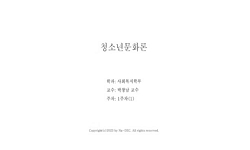본 연구는 청소년수련시설의 중·장기적인 관점에서 성장을 통해 청소년의 건강한 성장을 도모하고자 청소년지도사의 이직의도를 감소시키는 것을 목표로, 청소년지도사가 인식한 청소년...
http://chineseinput.net/에서 pinyin(병음)방식으로 중국어를 변환할 수 있습니다.
변환된 중국어를 복사하여 사용하시면 됩니다.
- 中文 을 입력하시려면 zhongwen을 입력하시고 space를누르시면됩니다.
- 北京 을 입력하시려면 beijing을 입력하시고 space를 누르시면 됩니다.

청소년지도사가 인식한 청소년수련시설의 조직문화 유형이 이직의도에 미치는 영향 - 직무 스트레스를 매개로 - = The impact of the organizational culture type of youthcenter recognized by youth worker on the turnover intentions : Through job stress as a mediator
한글로보기부가정보
국문 초록 (Abstract)
본 연구는 청소년수련시설의 중·장기적인 관점에서 성장을 통해 청소년의 건강한 성장을 도모하고자 청소년지도사의 이직의도를 감소시키는 것을 목표로, 청소년지도사가 인식한 청소년수련시설의 조직문화 유형이 이직의도에 미치는 영향에서 직무스트레스의 매개효과를 살펴보았다. 분석결과는 다음과 같다. 첫째, 청소년지도사가 인식한 청소년수련시설의 조직문화유형은 관계지향문화, 혁신지향문화, 위계지향문화, 과업지향문화순으로 나타났으며 관계지향문화는 인구사회학적 특성 중 연령만, 다른 세 개 유형은 연령과 직위에서 통계적 유의미함을 찾을 수 있었다. 둘째, 네 개의 조직문화 유형 중 관계지향문화와 혁신지향문화는 직무스트레스와 이직의도에 부(-)적 상관관계를 확인하였고 과업지향문화와 위계지향문화는 직무스트레스와 이직의도에 정(+)적 상관관계를 확인하였다. 셋째, 조직문화유형과 이직의도와의 관계에서 직무스트레스는 위계지향문화에 부분매개효과를 확인하였고, 관계지향문화 과업지향문화, 혁신지향문화에는 완전매개효과를 확인하였다. 이러한 연구결과를 바탕으로 청소년지도사의 이직의도를 감소시키기 위해 위계지향문화 조정 및 개선에 대한 노력이 필요하다. 더불어 조직적 차원의 직무스트레스에 대한 적극적인 관리가 필요하다. 마지막으로 조직문화 유형에 대한 이해 및 조성이 필요하다.
다국어 초록 (Multilingual Abstract)
The results of the study are as follows.
firstly, the organizational culture types perceived by youth workers in youth centers were relational culture, innovative culture, hierarchical culture, and taskoriented culture in order of prominence. Relational culture showed statistical significance only with age among demographic characteristics, while the other three types were statistically significant with both age and position. Secondly, among the four organizational culture types, relational culture and innovative culture were found to have a negative correlation with job stress and turnover intention, while task-oriented culture and hierarchical culture were found to have a positive correlation with job stress and turnover intention. Thirdly, in the relationship between organizational culture types and turnover intention, job stress was found to have a partial mediating effect on hierarchical culture, and a full mediating effect on relational culture, task-oriented culture, and innovative culture.
Based on these research findings, efforts to adjust and improve hierarchical culture are necessary to reduce turnover intention among youth workers. In addition, proactive management of organizational-level job stress is also necessary.
Lastly, there is a need for understanding and fostering organizational culture types.
This study aimed to reduce youth workers’ turnover intention by promoting healthy adolescent development through growth from a medium- to long-term perspective at youth centers. It examined the mediating effect of job stress on the relationship betw...
This study aimed to reduce youth workers’ turnover intention by promoting healthy adolescent development through growth from a medium- to long-term perspective at youth centers. It examined the mediating effect of job stress on the relationship between perceived organizational culture types of youth centers by youth workers and turnover intention.
The results of the study are as follows.
firstly, the organizational culture types perceived by youth workers in youth centers were relational culture, innovative culture, hierarchical culture, and taskoriented culture in order of prominence. Relational culture showed statistical significance only with age among demographic characteristics, while the other three types were statistically significant with both age and position. Secondly, among the four organizational culture types, relational culture and innovative culture were found to have a negative correlation with job stress and turnover intention, while task-oriented culture and hierarchical culture were found to have a positive correlation with job stress and turnover intention. Thirdly, in the relationship between organizational culture types and turnover intention, job stress was found to have a partial mediating effect on hierarchical culture, and a full mediating effect on relational culture, task-oriented culture, and innovative culture.
Based on these research findings, efforts to adjust and improve hierarchical culture are necessary to reduce turnover intention among youth workers. In addition, proactive management of organizational-level job stress is also necessary.
Lastly, there is a need for understanding and fostering organizational culture types.
동일학술지(권/호) 다른 논문
-
강의평가 운영 개선방안 연구 : S대학 사례를 중심으로
- 한국시민문화학회
- 전세일
- 2024
- KCI등재후보
-
상업스포츠센터 시설 선택요인이 소비자 만족도에 미치는 영향 연구
- 한국시민문화학회
- 이정헌
- 2024
- KCI등재후보
-
- 한국시민문화학회
- 김명구
- 2024
- KCI등재후보
-
아빠와 함께하는 신체활동 프로그램이 유아의 체력과 정서지능에 미치는 영향
- 한국시민문화학회
- 진성철
- 2024
- KCI등재후보




 KCI
KCI





